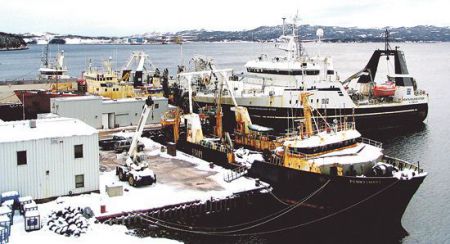IN OCTOBER 2011, the Harper government sent a memo to employees at the Department of Fisheries and Oceans (DFO) outlining steps being taken to “transform” the management of Canadian fisheries. At the same time, Minister of Fisheries and Oceans Keith Ashfield began holding consultations on “modernizing” the Canadian fisheries. Then in December, at the World Economic Forum in Davos, Harper said, “In the months to come, our government will undertake major transformations to position Canada for growth over the next generation.” Handing over the fisheries to the monopolies is part of this “transformation.”
Now, in the Parliament and in a series of articles in the media, the extent of the damage being inflicted by the Harper government is being revealed.
Changes to Fisheries Act leaked
The Vancouver Sun reports that former federal biologist Otto Langer was leaked a government document that outlines the government’s aim to eliminate habitat protection provisions from the Fisheries Act. Langer stated “this is a serious situation and will put Canada back to where we were in the pre-1976 period where Canada had no laws to protect fish habitat and no way to monitor the great industrial expansion that occurred in Canada, with the consequential loss of major fish habitat all across Canada.”
Langer said he was told the change would be included in upcoming federal omnibus legislation following the March 29 budget.
The current Fisheries Act bans activity that results in the “harmful alteration, disruption or destruction of fish habitat.” The new wording includes numerous exemptions to give the minister “or a person prescribed by the regulations” the authority to allow an “adverse effect” on fish considered of value. Langer said the “subjective and ambiguous” new wording would make the law extremely difficult to enforce. “For instance, what is a fish of economic, cultural or ecological value?” he asked.
In a statement following the leak, Minister Ashfield stated: “Federal fisheries policies designed to protect fish are outdated and unfocused in terms of balancing environmental and economic realities.”
Monopolies want changes to speed regulatory approvals
According to a briefing note prepared for Ashfield obtained by Postmedia News “Some of the largest and most complex natural resource and industrial development projects across the country are affected by Fisheries Actrequirements, which are consistently identified as one of the top federal regulatory irritants by stakeholders across the country,”
The note said the legislation’s habitat protection provisions are “one of the most frequent triggers” of federal assessments under the Canadian Environmental Assessment Act (CEAA).
A CEAA review “can occur for a project of any size, and across many sectors of the economy (eg. Construction, urban development, agriculture, nature resource development).”
According to Postmedia, among the representatives of the monopolies raising concerns about the Fisheries Act are: the Canadian Association of Petroleum Producers, the Business Council of BC, the Canadian Electricity Association, the Canadian Hydropower Association, EnCana Corp., Teck Resources Ltd., the Mining Association of Canada, the Canadian Energy Pipeline Association, the Council of Forest Industries, and the Saskatchewan Power Corp.
Doug Routledge, vice-president of the Council of Forest Industries (COFI), one of the industry associations that has lobbied on the Fisheries Act stated, “There’s no question in our mind that many pieces of legislation, including the fisheries legislation, could be made more efficient from an administrative point of view, and therefore lower our operating costs and improve our competitiveness without compromising the conservation goals and objectives of the legislation.”
Cuts to fisheries monitoring
In October 2011, writing in iPolitics, Michael Harris reported on the significance of cuts to funding at DFO as part of the Strategic and Operating Review and how this is affecting monitoring of the fisheries.
“Last week news broke that the DFO, was planning to cut its scientific budget for fish stock monitoring. Sadly, that in itself is not news.
“But what is noteworthy about DFO’s new planned cuts is that they affect the scientific monitoring of fish stocks. According to DFO flaks, the department can satisfy Treasury Board’s demand for cuts without threatening the stability of fish stocks – an epic absurdity even for the trained-seal bureaucracy serving Stephen Harper.
“As the owner of the resource on behalf of the Canadian people, Ottawa sets the yearly quotas that the fishing industry is permitted to harvest. A critical part of the process for setting that number at sustainable levels is research.”
He quotes marine biologist Jeff Hutchings of Dalhousie University stating: “Accurate estimation of fish stock abundance relies upon annual estimates of fish abundance as obtained from DFO’s annually deployed multi-species research surveys.”
Harris explains the significance: “The key word here is ‘multi-species.’ Under DFO’s new plan to save $17 million and cut 275 jobs, quotas for individual species will be established not for one, but for three to five years. The result is that the industry will be fishing valuable species more while Ottawa counts them less. It is even possible that DFO may not be conducting multi-species surveys at all in the near future.
Addressing who benefits from such changes he writes: “The only beneficiary of this plan (Ottawa makes no bones about saying it), is the corporate fishing sector. They will now get longer term access to valuable fish stocks. The Old Boys club of Canadian fisheries management gave us the Great Northern Cod collapse. They have reconvened the corporate/bureaucratic alliance that resolves every doubt about sustainability in favour of exploitation.”
Harris quotes Hutchings again: “I think that DFO intends to download costs associated with fish monitoring to industry. This would not be prudent in my view… It is improbable that industry would take on the costs associated with multi-species surveys. Rather, they would undertake their own surveys on the single species that is of interest to them.”
“Industry has always had its thumb on the scale when it comes to setting quotas, partially by Ottawa’s practice of using commercial catch rates to ‘tweak’ DFO’s own stock assessments, and partially by good old fashioned political blackmail. Quota means jobs both at sea and ashore, and quota cuts bring the politicians unhappy voters and higher social welfare costs.
“But to formally pass responsibility to industry for assessing stock strength, when their historical role has been maximum exploitation of the resource for profit, would be to invite the next TAGS program. The $4-billion support program in the wake of the cod collapse didn’t buy back fishing licenses, didn’t change the reality of too many fishermen chasing too few fish, and didn’t reduce an overall fishing capacity that is three times what is necessary even if the cod were to come back. It was all short-term income support and no long term solution.”
Fishermen oppose monopolization in fishing industry
Various provinces and independent and small fishermen are raising alarm at government moves to get rid of fleet separation policies that prevent the same company from carrying out fishing and processing.
On March 6 in the Parliament NDP MP Fin Donnelly stated, “[T]he Minister of Fisheries and Oceans heard what provincial ministers think about his plan to change the fleet separation policy. It is pretty straightforward. Quebec, Nova Scotia and Prince Edward Island all oppose the proposed changes. Atlantic fishers and communities also oppose them. The fleet separation policy is essential to the survival of east coast fishers. Will the Conservatives commit to maintaining the fleet separation policy and protecting the coastal fishery?”
In response, Minister Ashfield stated: “The assumptions in the question are ridiculous. We are seeking the advice and views of fishermen. That is what we should be doing as a responsible government and it is what I will do as Minister of Fisheries and Oceans. Our government is not advancing any particular position other than to reaffirm our commitment to the economic health of fishermen and our communities.”
On March 5, the Fish Food and Allied Workers of the Canadian Auto Workers issued a statement raising serious concerns over the direction the Harper government is taking.
“Fishermen’s organizations from across Atlantic Canada say DFO is opening the door to the elimination of Canada’s independent fishermen and moving to de-regulate the Atlantic fishery,” the statement said.
“Representatives of thirty-three (33) owner-operator fleets from Quebec to Newfoundland say the Department has shown nothing but contempt for fishermen and their organizations by launching a top-down, centrally controlled and manipulative policy process without any notice.
They released a joint policy statement today in response to DFO’s discussion document entitled, “The Future of Canada’s Commercial Fisheries.”
In their statement, the fishermen’s organizations say “the Department’s initiative is a barely veiled attack on the policies that protect self-employed, independent fishermen and a justification for hobbling even further Canada’s dwindling fisheries science capability.”
They say the DFO is biased against small businesses in the fishery and in favour of large corporations. They fear the Department will allow fish processors and other investors to get their hands on valuable lobster, crab and shrimp licences. Their statement goes on to say:
“The inshore and mid-shore owner-operator fleets in Atlantic Canada land more than 75 per cent of the value of Atlantic fisheries through their control of lobster and crab fishing and their majority share of the shrimp fishery. Under government policies in place since the early 1980s licences to these fisheries are restricted to individual fishermen who must own and operate their own vessels. Fish companies have been trying to gain access to these licences for years.
“The fishermen’s organizations say they are fearful the Department plans to introduce British Columbia’s disastrous licence leasing schemes to the Atlantic fishery. The leasing policy in effect in BC allows non-fishermen to control licences and quota and lease them to working fishermen for up to 75 per cent of the value of their landings.”
Government permitting monopolies to undermine herring stocks in Gulf of St. Lawrence
On March 14 in the Parliament, Liberal MP Lawrence MacAulay exposed recent developments in the Great Lakes fishery. “[L]ast year purse seiners were unable to catch all of the remaining herring in the Gulf of St. Lawrence. Now we are hearing that the minister has cut a deal to allow massive corporate mid-water trawlers to fish in the Gulf of St. Lawrence.
“Will the government, knowing that these massive corporate trawlers will destroy the species, inform the House and Canadians that it will not allow this type of trawler in the Gulf of St. Lawrence, which will destroy the herring species?”
Cuts to Search and Rescue
On March 14, NDP MP Jack Harris presented a petition in the House of Commons from residents of St. John’s and other parts of Newfoundland and Labrador who are opposed to the decision to close the marine rescue coordination centre in St. John’s. The centre provides important services to the small communities and fishermen of the region.
“They are concerned that the government needs to understand and acknowledge that the closure of the centre will mean the service will suffer and lives will be put at risk,” Harris stated.
“This search and rescue centre in St. John’s is responsible for 900,000 square kilometres of ocean and 28,000 kilometres of coastline, and that is just in the Newfoundland and Labrador region. This is a big and important country and we need to protect our citizens. These rescue coordinators have local knowledge of the coastlines, of the people involved and of the dialect and language that has been spoken. It is very important that this rescue centre be kept open. The petitioners so ask this honourable House,” he added.
TML Weekly Information Project, March 17, 2012 – No. 11
Related Reading
Tony Seed, Harper’s mayday mayhem: Newfoundlanders demonstrate against Harper government’s wrecking agenda, June 28, 2011
Lockout of Newfoundland trawlermen – mass police arrest of workers, February 11, 2012
Dougal MacDonald, Fisheries and Oceans: Pseudoscience in the service of imperialism, February 21, 2012
Muzzling of scientists: Open Letter to Prime Minister Harper, February 18, 2012






